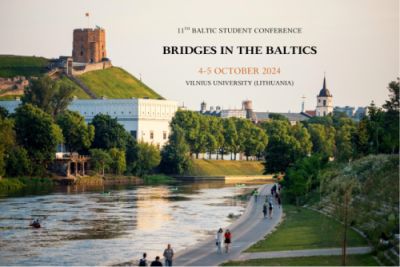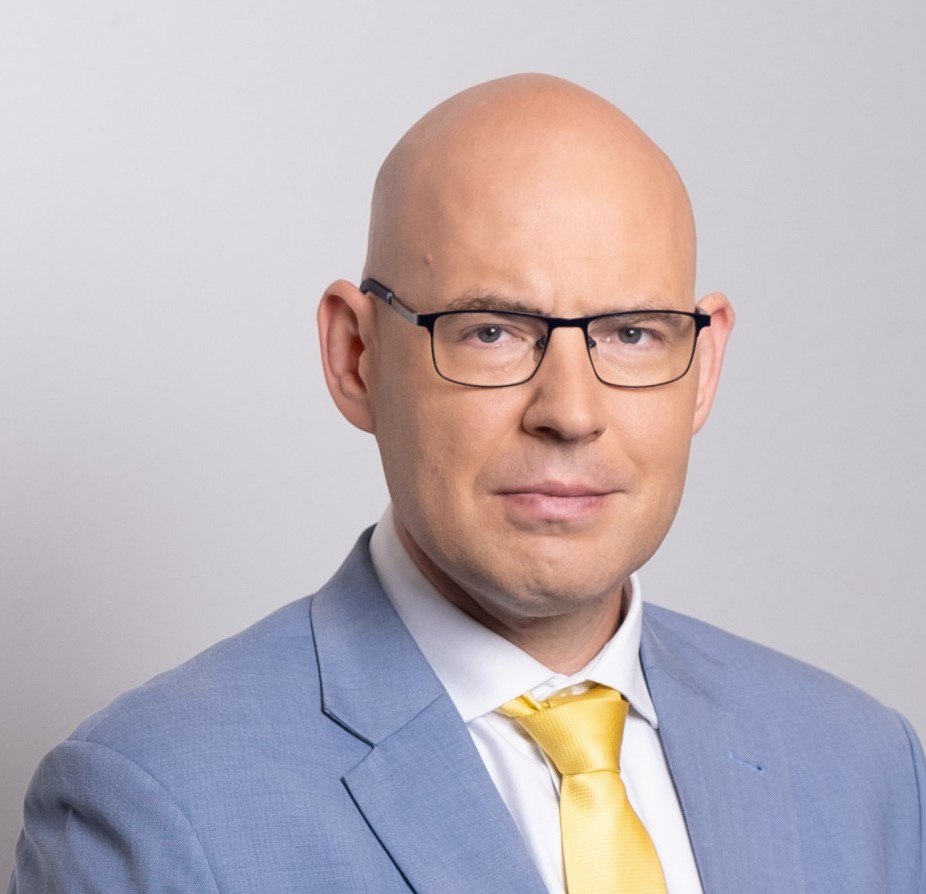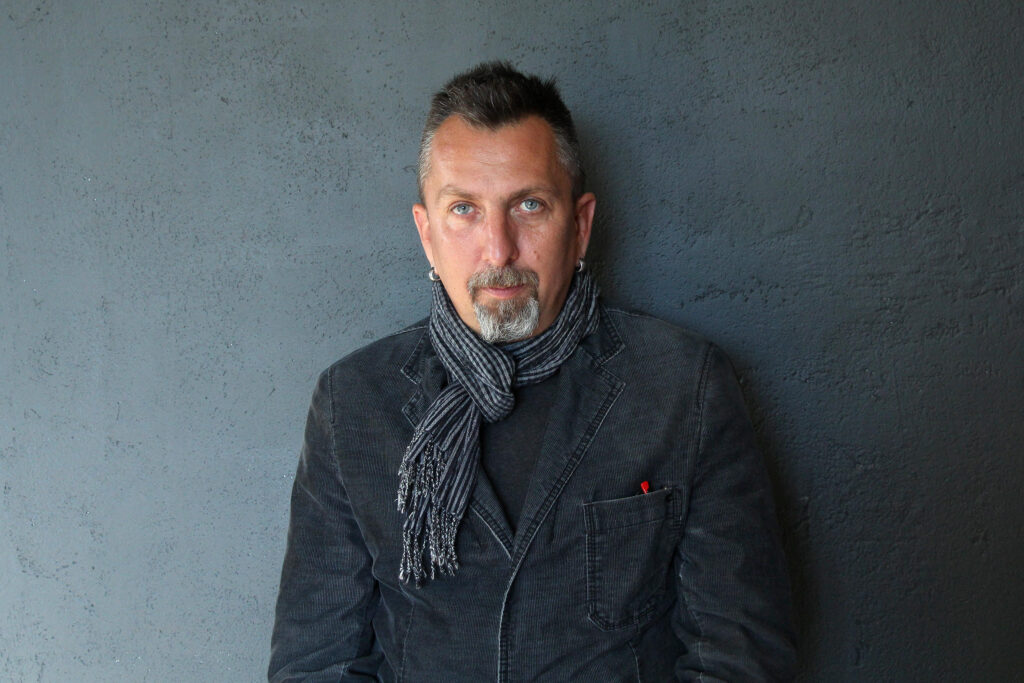BALTIC STUDENT CONFERENCE BRIDGES IN THE BALTICS
Vilnius 2024

Institute for the Languages and Cultures of the Baltic in Vilnius University organized the 11th Baltic Student Conference “Bridges in the Baltics” on October 4–5, 2024, in Vilnius.
The aim of the conference is to bring together students whose studies and research focus on the languages or culture of the three Baltic States, to give them the possibility to meet their peers from other countries and universities, to present their academic work and interests, to learn from each other and to make new contacts. The conference welcomes everyone who is currently pursuing a Bachelor’s, Master’s or PhD degree at any university in the Baltic States or elsewhere.
The working languages of the conference are Lithuanian, Latvian, Estonian and English. Everyone is welcome to give their presentation in any language mentioned above and we encourage using the languages of the Baltic States. However, the abstract and presentation slides should be in English.
PROGRAMME (updated September 27)
PARALLEL SESSIONS (updated September 27)
ABSTRACTS (updated September 27)
PLENARY SPEAKERS
doc. dr. Inga Vidugirytė-Pakerienė. LITERARY GEOGRAPHIES: READING LITERATURE FROM THE PERSPECTIVE OF SPACE AND PLACE
In my paper, I will present my research in the field of literary geographies, which I am conducting in the ongoing project “Women’s City in Contemporary Lithuanian Literature”. In this research, I read women’s literary works and try to define the concept of the city created by women and the interaction of their imagination with urban spaces and places in the process of identity formation. My paper consists of two parts. In the first part, I will give an overview of the field of literary geography and cartography. In the second part, I will present the case study of the novel by Virginija Kulvinskaitė “kai aš buvau malalietka” (2019, part of the novel is translated into English under the title Juvenilia). The aim of the paper is to show how reading from a geographical perspective can enhance our understanding of the spatial and social aspects of a literary work.

Inga Vidugirytė-Pakerienė is an Associate Professor in Comparative Literature at the Institute of Literary, Cultural and Translation Studies, Vilnius University (Lithuania). She is the author of the books Culture of Laughter (Vilnius University Press, 2012, in Lithuanian) and Gogol and the Geographical Imagination of Romanticism (Vilnius University Press, 2018; Russian edition – Moscow: Novoe Literaturnoe Obozrenie, 2019). In 2011-2015, she was the principal investigator in the research project Geography of Literature: textual territories and imaginary maps, and led the research group on the digital mapping of Vilnius literature: www.vilniusliterature.flf.vu.lt. Vidugirytė-Pakerienė is currently working on a book exploring urban imaginaries in contemporary Lithuanian women’s literature.
Marko KOPLIMAA. THE DESTRUCTION OF A NATION: THE STATE OF BELARUS LANGUAGE AND CULTURE.
Belarus is a distinct nation that share history and aspects of culture with all its neighbors, be it Russia, Ukraine, Poland or Lithuania. But unlike its neighbors, the nation of Belarus has enjoyed only brief periods of independence. Still the unique language and culture of Belarus have survived and development through centuries. Almost uniquely in history, today, the government of a formally independent nation is on a mission of eradicating its own language and culture. During the presentation Marko will look into the current state in Belarus as well as ways efforts to preserve the Belarus culture can be supported.

Marko Koplimaa is working as the Estonian Special Representative to the Democratic Forces of Belarus, at the Estonian Embassy in Vilnius. After graduating Tartu University in 2010, with a degree in history, Marko joined the Estonian diplomatic service. In addition to working at the Foreign Ministry, Marko has worked at the Estonian Representation to NATO, the Estonian Embassy in Washington as well as the Ministry of Defense of Estonia. Currently, Marko is also in the process of earning a Masters degree in Strategic Management from Tartu University.
Dr. phil. Valts ERNŠTREITS. ENDANGERED LANGUAGES AND CULTURES IN THE DIGITAL ERA
Latvia’s indigenous Livonian language is one of the most endangered languages in the world. Digital era and evolving digital technology bring new opportunities for such endangered languages, but also new challenges – lack of data needed to build technologies and restrictions of data production, danger of data pollution, expansion of majority language domains in the digital environment, limitations in application of conventional digital research methods, and many others. In my presentation I will talk about Livonian experiences working with extremely limited sources and data, data extraction and data prosthetics, application of technologies and efficient approaches when working extremely limited resources

Director of the University of Latvia Livonian Institute Dr. phil. Valts Ernštreits is a Livonian-born linguist and language activist. He specializes in revitalization, development and digital empowerment of Latvia’s indigenous Livonian language. His research and community work has been widely acknowledged in Latvia and abroad. As a Livonian himself and one of the few speakers of the Livonian language, he has been involved with many activities – both physical and digital – focused on safeguarding and empowering Livonian language and heritage for over 30 years, also serving as a mediator between NGOs, governmental institutions, and academia. He is also a member of the Global Task Force for Making a Decade of Indigenous Languages (2022–2023).
Email: bridgesinthebaltics2024@gmail.com
Home page: https://sisu.ut.ee/balticbridge
Facebook: https://www.facebook.com/balticbridge


